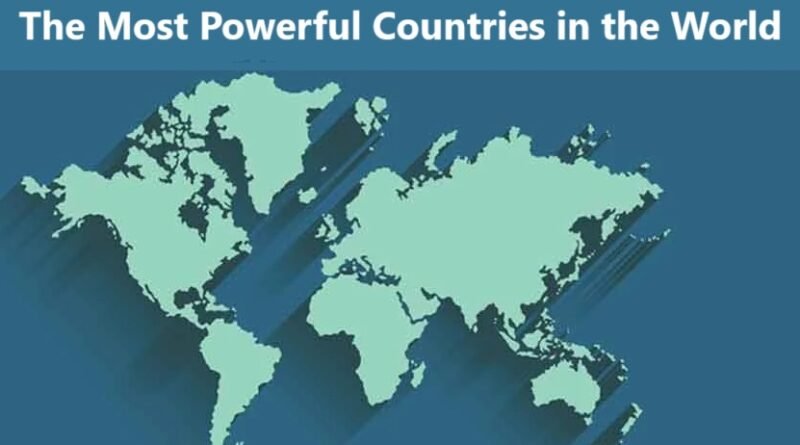The Most Powerful Countries in the World 2025
In the modern era, a country’s power is measured by its ability to influence global politics, command economic resources, project military strength, and drive cultural and technological advancements. Below, we explore the countries widely regarded as the most powerful, categorized by their global standing, and conclude with the sources of this evaluation.
Superpowers
1. United States The United States stands as the epitome of global power. With the world’s largest economy, valued at over $25 trillion, and unparalleled military capabilities, the U.S. wields influence across every corner of the globe. Its cultural exports, from Hollywood to Silicon Valley’s tech giants, define global trends. The dollar’s status as the reserve currency and its membership in international institutions like the UN Security Council underscore its economic and political dominance.
2. China China has emerged as a formidable superpower, leveraging its economic growth and strategic investments in global infrastructure through initiatives like the Belt and Road. With the second-largest GDP and advancements in technology, such as artificial intelligence and 5G, China is redefining global competition. Its large population and strong military presence add to its geopolitical influence.
3. Russia Despite economic sanctions and a smaller economy compared to other superpowers, Russia’s military might, nuclear arsenal, and energy resources cement its position. It plays a critical role in global geopolitics, particularly in Eurasia and the Middle East, often leveraging its influence in strategic conflicts and energy politics.
Major Powers
4. India India’s growing economic clout and strategic geopolitical position make it a key global player. With the second-largest population, India is expanding its military capabilities and emerging as a leader in technology and space exploration. Its role in the Indo-Pacific and partnerships with the U.S. and other allies underscore its significance.
5. Japan Known for its advanced technology and innovation, Japan’s economy ranks third globally. It maintains a significant cultural influence through media, automotive industries, and robotics. Despite constitutional limitations on its military, Japan plays a vital role in regional security in East Asia.
6. Germany Germany is Europe’s economic powerhouse, with the largest GDP in the region. Its leadership role in the European Union and commitment to renewable energy and innovation enhance its global standing. Germany’s influence is evident in trade, diplomacy, and industrial prowess.
7. United Kingdom The UK’s historical legacy as a colonial power, combined with its modern influence as a financial and cultural hub, ensures its place among major powers. London’s financial markets, strong military, and global reach through the Commonwealth are critical factors.
8. France France’s influence spans culture, military, and global politics. As a nuclear power and a permanent UN Security Council member, it plays a leading role in international diplomacy. Paris is a symbol of global culture and art, further amplifying France’s soft power.
9. Brazil Brazil’s regional dominance in South America is bolstered by its large economy and abundant natural resources. Its leadership in environmental issues, particularly regarding the Amazon rainforest, gives it significant global influence.
10. Saudi Arabia As the world’s largest oil exporter, Saudi Arabia holds a pivotal role in global energy markets. Its influence in the Middle East and its Vision 2030 reform agenda aim to diversify its economy and enhance its global presence.
11. Turkey Turkey’s strategic location as a bridge between Europe and Asia gives it unique geopolitical leverage. Its growing economy, military capabilities, and cultural influence in the Muslim world make it a regional powerhouse.
12. South Korea South Korea is a technological and cultural juggernaut. With global brands like Samsung and the worldwide popularity of K-pop and Korean dramas, it has become a cultural export leader. Its strong military alliance with the U.S. further solidifies its regional and global significance.
13. Canada Canada’s vast natural resources and stable economy make it a significant player in global markets. Known for its peacekeeping and humanitarian efforts, Canada’s influence extends beyond its borders through its commitment to multilateralism.
14. Australia Australia’s resource-rich economy and strategic location in the Pacific make it a regional leader. It is also a key ally in Western coalitions and has growing ties with Indo-Pacific nations.
Emerging Powers
15. Indonesia As the largest economy in Southeast Asia, Indonesia’s influence is rising. Its large population and strategic location along key maritime trade routes make it a critical player in regional and global trade.
16. Nigeria Nigeria is Africa’s largest economy and a regional leader. Its growing population and influence in African Union affairs position it as a key player in the continent’s future.
17. South Africa South Africa’s economic strength and leadership role in African diplomacy make it an influential country. Its natural resources and position in BRICS (Brazil, Russia, India, China, South Africa) highlight its importance.
18. Iran Iran’s strategic location and vast energy resources give it significant regional influence, particularly in the Middle East. Despite sanctions, it remains a pivotal player in regional geopolitics.
19. Italy Italy’s cultural legacy and economic influence within Europe ensure its global relevance. Its role in EU affairs and strong industrial base make it a notable power.
Conclusion
The list of powerful countries reflects a dynamic world where influence is multifaceted, encompassing economic strength, military capabilities, cultural reach, and political stability. While some countries hold traditional power due to their historical dominance, others are emerging as new players in the global arena, reshaping the geopolitical landscape.

